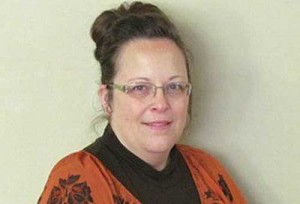 FRANKFORT, Ky. — A federal judge has rejected the American Civil Liberties Union’s (ACLU) attempt to recover more than $230,000 in costs from Kentucky county clerk Kim Davis over its recent legal battle surrounding her refusal to issue marriage licenses to homosexuals as long as her name was on the document.
FRANKFORT, Ky. — A federal judge has rejected the American Civil Liberties Union’s (ACLU) attempt to recover more than $230,000 in costs from Kentucky county clerk Kim Davis over its recent legal battle surrounding her refusal to issue marriage licenses to homosexuals as long as her name was on the document.
“[T]he plaintiffs are not ‘prevailing parties’ within the meaning of § 1988, and are therefore not entitled to an award of attorneys’ fees,” wrote U. S. Magistrate Judge Edward Atkins on Monday.
He noted that legislative changes—not a court ruling—brought an end to the legal matter, which was subsequently declared moot. Therefore, Atkins explained, the ACLU and the homosexuals it represented cannot be considered the victors in the case.
“[U]pon the enactment of Kentucky Senate Bill 216, which removed the name of the county clerk from marriage license forms, all claims asserted in this action, including the pending appeals, were dismissed as moot, and the preliminary injunction, vacated,” he outlined.
“This voluntary conduct by the state changing the marriage license forms so that the county clerk, Kim Davis, was no longer required to sign the license, does not signal that the plaintiffs prevailed in the action, and cannot serve as the basis for an award of attorney’s fees,” Atkins ruled.
As previously reported, the ACLU had sued Davis in November, asking that the court require her to pay $233,058 in legal fees and other expenses from the marriage license case.
“Courts recognize that when successful civil rights plaintiffs obtain a direct benefit from a court-ordered victory, such as in this case, they can be entitled to their legal expenses to deter future civil rights violations by government officials,” William Sharp, legal director of the Kentucky ACLU, told reporters.
Davis’ attorneys, conversely, argued that the organization wasn’t entitled to the payment since Davis prevailed in the matter in the long run.
“The ACLU is not entitled to attorney’s fees according to the prevailing standard in the Sixth Circuit,” remarked Mat Staver, founder and chairman of Liberty Counsel, in a statement. “Kim Davis won the case and the case is closed. County clerks are now able to perform their public service without being forced to compromise their religious liberty.”
U.S. District Judge David Bunning had dismissed the outstanding legal challenges against Davis this past August after the state legislature passed a law that removed the names of county clerks from all marriage licenses, thus assuaging Davis’ concerns.
“In light of these proceedings, and in view of the fact that the marriage licenses continue to be issued without incident, there no longer remains a case or controversy before the court,” he wrote.
Davis had been in national headlines in 2015 after she declined to issue same-sex “marriage” licenses as long as her name was on the documents. Davis, who attends a Oneness Apostolic Pentecostal assembly, said that she would do so if her name was removed.
Her refusal soon led to three lawsuits—Miller v. Davis, Ermold v. Davis and Yates v. Davis—filed by homosexuals who sought to force Davis to issue the licenses.
The ACLU led the legal push, and in September 2015, U.S. District Judge David Bunning ordered that Davis issue the licenses despite her religious identity. As she continued to refuse to issue the licenses without the accommodation, Bunning ordered that Davis be placed behind bars until she was willing to comply. In the meantime, the judge arranged for a deputy clerk to sign the licenses in her absence.
Davis was released from the Carter County Jail five days later after her attorneys filed an appeal of the contempt order, and also because Bunning was satisfied that her deputy clerks were providing the licenses instead. He stipulated her release on the condition that she not interfere with her deputies.
By the end of the year, new Kentucky Gov. Matt Bevin issued an executive order for the Department for Libraries and Archives to release new licenses that do not cite the county or the name of the county clerk. Months later, the state legislature passed a law altering the licenses similar to Bevin’s order.
“[T]he plaintiffs’ claim for relief did not become moot when a particular event occurred such as the issuance of marriage licenses, but became moot due to a change of law,” Atkins noted on Monday. “This voluntary conduct, however, cannot serve as the basis for an award of attorney’s fees.”
Liberty Counsel applauded Atkins’ decision.
“The ACLU and others still want to punish Kim Davis for daring to take a stand for religious liberty,” Vice President of Legal Affairs Horatio Mihet said in a statement, “but today the court recognized that the ACLU does not deserve to get paid for its bullying. Kim Davis never violated her conscience, and she still has her job and her freedom—that is a win for Kim and for all Americans who want to perform public service without being forced to compromise their religious liberties.”
Become a Christian News Network Supporter...


